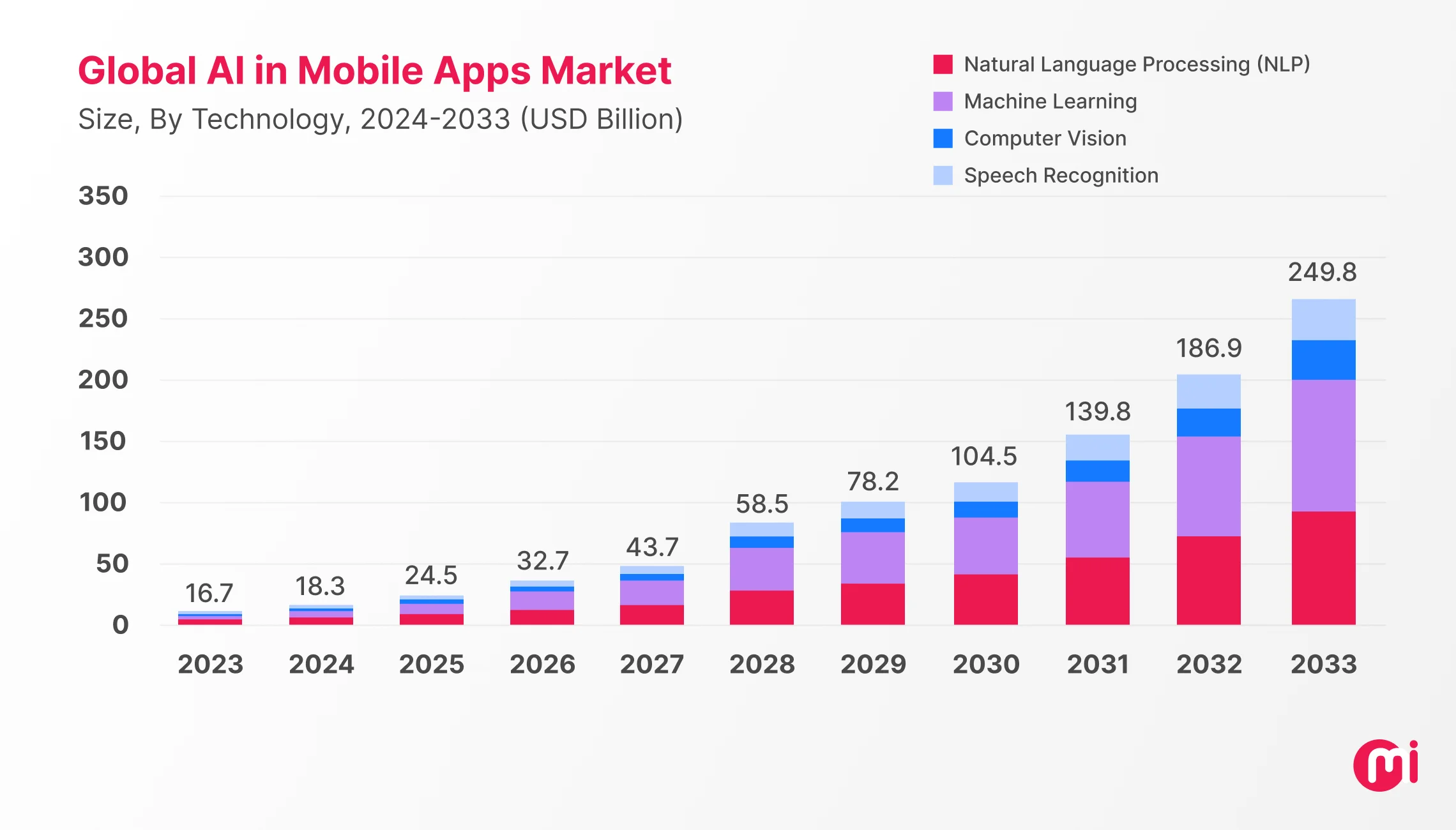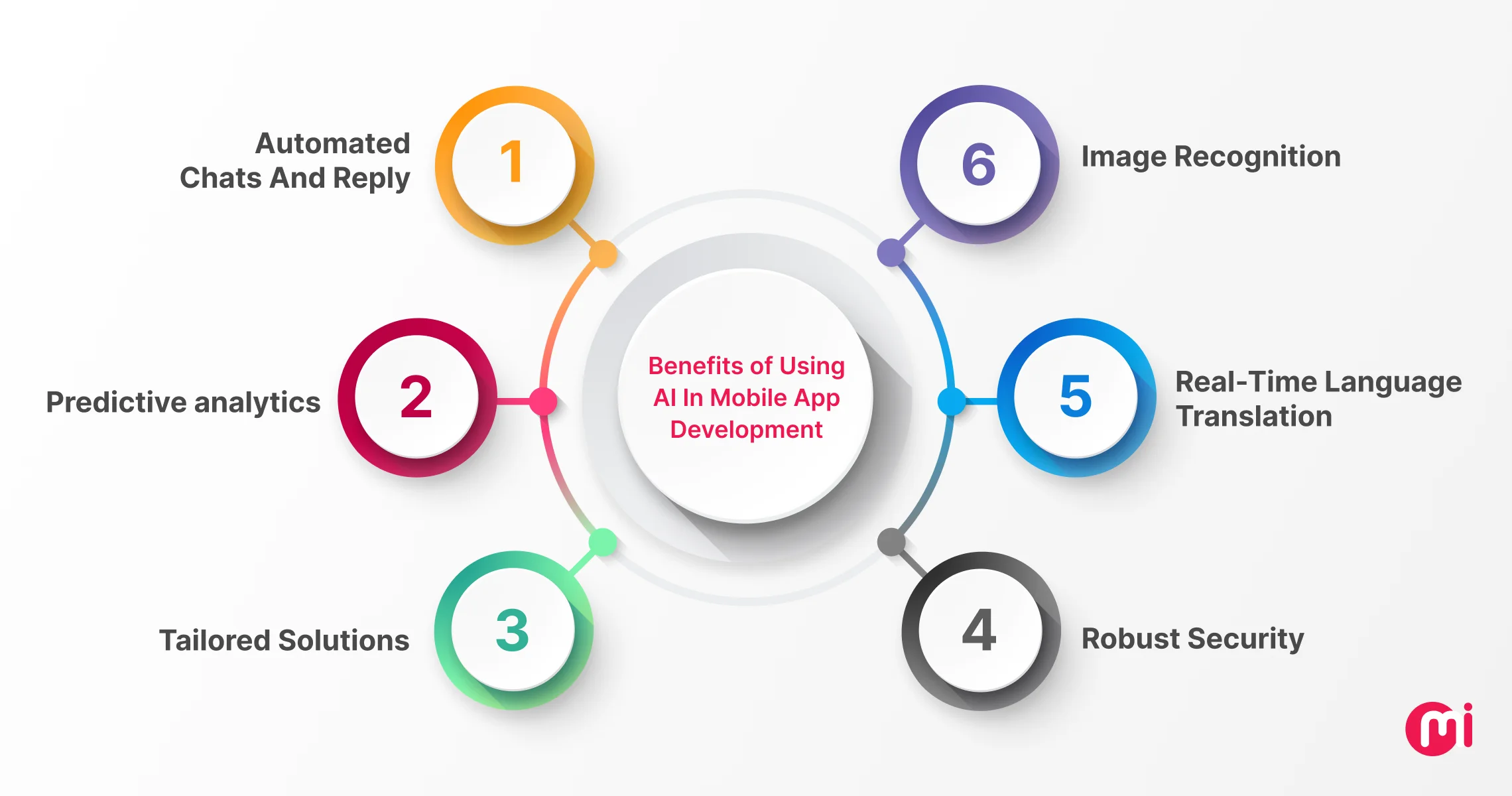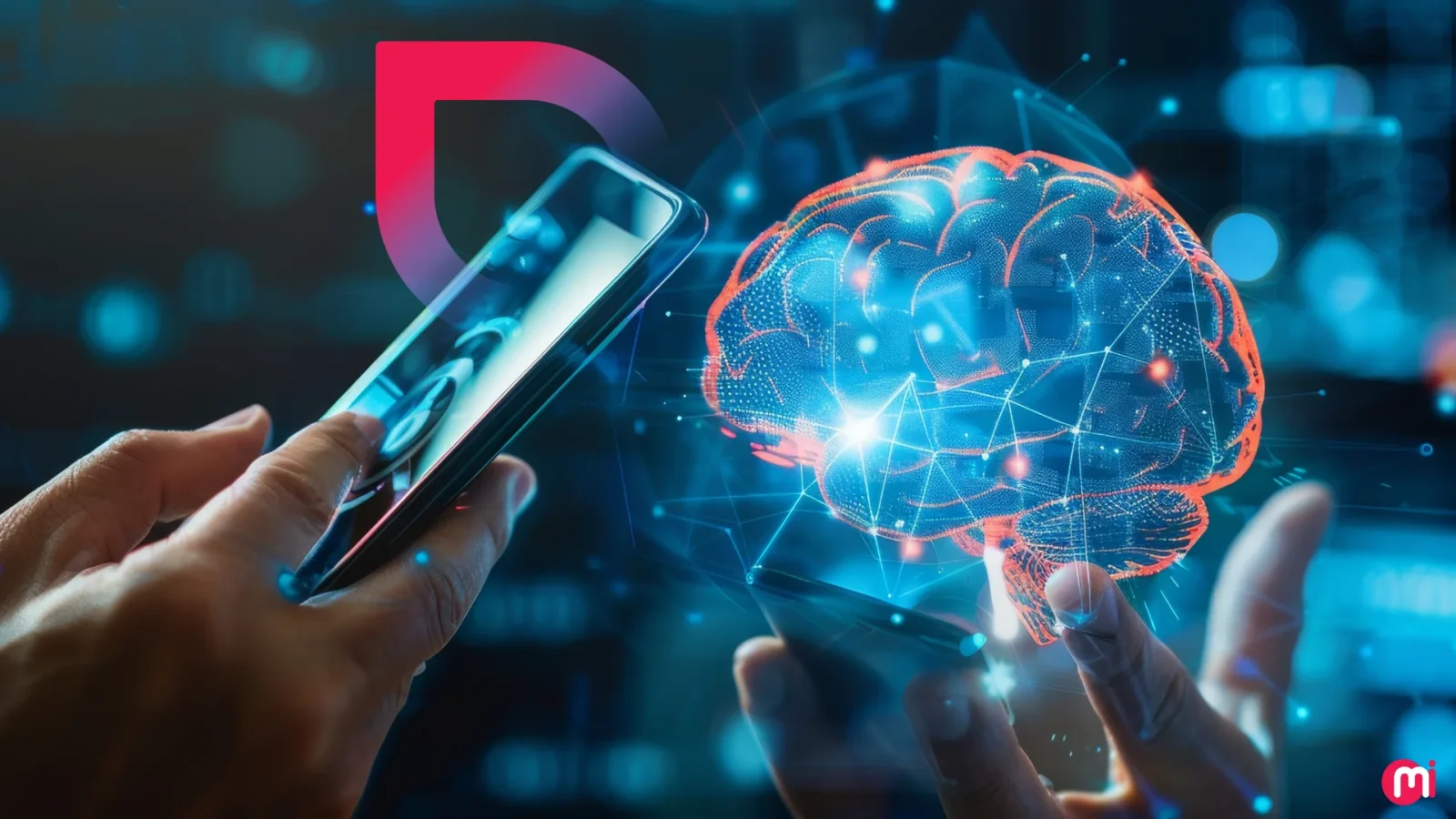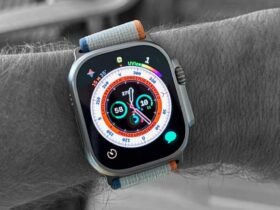There’s a significant role of AI in mobile app development, as it helps you yield highly sophisticated mobile apps that align with modern-era business needs. Be it user behavior analysis, predictive analytics, determining future trends, efficient warehouse management, or you name it, AI-powered mobile apps, help businesses deliver tailored solutions to users through various measures. Browse through this blog and learn how using AI in mobile app development makes a huge difference in today’s bus!
The tech world is ever-evolving, changing day in and day out, and so should your mobile app. AI plays a huge role in mobile app development, enabling developers to yield sophisticated apps and making a significant difference in how people interact with traditional apps. It even outsmarts the traditional apps, necessitating it to build AI-powered apps.
AI-enabled mobile apps come embedded with a variety of state-of-the-art features, including predictive analysis to track users’ historical searches and predict future trends, chatbots for automated chats, and many more, making them completely user-friendly and business-oriented.
Backed by these attributes, AI is turning mobile apps into more intelligent and responsive resources to provide users with tailored solutions. Browse through this blog and learn the importance of AI in mobile app development before getting engaged with an AI development company!
Role of AI In Mobile App Development
In its broader terms, artificial intelligence is a kind of intelligence exhibited by machines, specifically computer systems. It tends to be a field of research in computer science that studies and develops methods and software, enabling machines to perceive their surroundings and utilize intelligence to take appropriate actions and achieve goals where they are destined to.
Right from predictive analytics to automated chats, and tailor-made solutions, AI-powered mobile apps feature a wide array of conveniences, making AI a must-have for businesses and mobile app development service providers alike.
Some high-profile AI-powered features, for example, are the recommendation systems in apps like YouTube and Netflix and interactive systems via human speech like Google Assistant, Alexa, and Siri.
AI plays a significant role in expanding the competencies of mobile apps. It makes use of machine learning to understand specific patterns and deliver what’s needed by the users.
Current State of AI In Mobile App Development Industry
Before diving deeper, let’s have a quick glance at the statistics, showing the proliferated use of AI in mobile app development.
- An estimated 230 million people across the globe tend to use AI in mobile apps.
- Siri has 36% of the total voice assistant market share and is used by more than 660 million people a month.
- Around 66% of businesses plan to make an investment in AI, aiming to enhance their mobile app’s experience.
- The AI in mobile apps market size is anticipated to reach around $249.8 billion by 2033, from $16.7 billion in 2023. The growth will be at a CAGR of 33.7% between the forecasted period (2024 to 2033).
Have a look at the image below:


Be it voice assistants, predictive analytics, or anything else, the mobile app development industry is experiencing a huge growth in AI app development. The stats above show how the marketplace is going to witness rapid growth in the decade to come.
Benefits of Using AI In Mobile App Development
Right from voice recognition to image recognition, chatbots, and predictive analytics, there are plenty of benefits that elevate the importance of AI in mobile app development. Following are a few of the significant ones, if we name a few!


1. Automated Chats And Reply
AI-based app development, with chatbots, excels at replying automatically with no need for human intervention. Many AI-enabled apps like Google Assistant, Alexa, and Duolingo have conversational UI, providing a humanoid conversational experience.
Chatbots enable mobile apps to engage users easily by providing them with an interactive user experience with around-the-clock assistance.
2. Predictive Analytics
Predictive analytics tends to be an AI-powered feature in mobile apps that makes use of machine learning algorithms and accesses user’s data. This data assessment is based on the user’s browsing history, search intent, and browsing history to determine what they are actually looking for and provide suitable solutions.
Predictive analytics allows businesses to know and provide customized solutions to their target customers.
3. Tailored Solutions
ML (Machine Learning), a subset of AI integrated with NLP (natural language processing) provides a realistic interaction as per user behavior. It helps your app learn from the user’s behaviors and specific patterns to determine what the user is actually seeking and provide them with tailored offerings, ensuring long-term engagement.
Netflix, for example, makes use of this particular approach to offer specific content recommendations to users that align with their needs and preferences.
4. Image Recognition
Embedding artificial intelligence in mobile apps provides image recognition capabilities, easing a multitude of procedures. Businesses in various sectors like eCommerce, healthcare, and social media can make use of image recognition technology. It employs machine learning algorithms to recognize specific features and patterns in an image.
For instance, eCommerce apps like Amazon utilize image recognition, allowing users to search for specific products just by uploading an image. The mobile app analyzes and recognizes the image and identifies products, easing product searches for specific customers.
Furthermore, a healthcare app can employ the very feature to analyze medical images like MRIs, and X-rays to address health issues.
5. Real-Time Language Translation
Artificial intelligence provides businesses with the competencies to integrate AI-enabled translators into their mobile apps for a seamless and real-time language translation facility. Some examples of real-time language translators include Google Translate, Notta, and Microsoft Translator.
Moreover, the real-time language translation in a mobile app allows users to communicate with people from across the globe with no interruption created by language barriers.
6. Robust Security
AI-enabled mobile apps come embedded with a biometric authentication feature, aimed at conducting a user’s identity and granting permissions to access crucial data. These applications tend to be embellished with robust and innovative functionalities like sensory recognition, facial recognition, gesture control, voice recognition, and the like.
The high-performance security feature ensures data security from hacking or many other kinds of cyber security threats. The feature is crucial for banking and finance industries, ensuring robust security for users.
Use Cases of AI In Mobile App Development
From chatbots to digital assistants and personalization, there are many use cases of artificial intelligence in mobile app development. AI has completely revolutionized how these apps operate, easing the way people conduct their day-to-day businesses. Have a look at a few of the use cases of AI-powered mobile apps!
Chatbots
Duolingo’s Lily, SEPHORA’s Ora, and Kuki AI are excellent examples of AI-powered chatbots employed in mobile apps. They automate messaging systems that provide personalized chatting solutions around the clock with no need for human operators. They tend to answer user’s queries, resolving them in no time. Using NLP (Natural Language Processing), chatbots can understand a user’s requests and respond appropriately.
Digital Assistants
Google Assistants, Apple’s Siri, and Amazon’s Alexa are some of the top-notch real-life examples of digital assistants. Leveraging voice recognition technology, these virtual assistants identify the searcher’s voice and the intent of what’s actually being said, intending to carry out required commands.
Digital assistants allow users to communicate with the app with no need to click around it.
Object Detection
Is your potential mobile app going to prioritize visual searches? If so, employing AI-enabled object recognition technology is a must-have. The object detection feature in a mobile app detects objects, locations, people, as well as other relevant elements. Google Lens, Pinterest Lens, Amazon Shopping, and Snapchat are some real-life examples of object detection features in a mobile app.
Google Lens uses a phone’s camera to recognize text, objects, and landmarks to provide information relating to translating text, and items, identifying animals and plants, and so on.
Pinterest Lens enables users to take pictures of any object and find related pins on Pinterest.
Amazon Shopping provides you with a feature allowing you to take any picture and find it on Amazon.
Predictive Analytics
No matter whether you’re in retail, finance, healthcare, or any other industry, what if you could anticipate future needs and serve customers with what they actually need? Thanks to the predictive analytics feature AI-powered mobile app, it helps you do so. Predictive analytics ensures assessing users’ historical data, thereby predicting future needs, so that you can get well-prepared beforehand.
Personalization
AI-powered mobile apps tend to keep an eye on customer behavior and preferences, thereby, allowing you to know what they like the most. With this feature, you can be aware of real-time information about users and provide them with personalized solutions as per their specific needs.
Shopify can be an excellent example of an AI-powered app for personalized solutions. It analyzes sales data to forecast trends and allows merchants to know which product is going to reign supreme in the future marketplace.
Shopify provides tailored recommendations to customers based on their shopping behavior, preferences, and historical purchases.
Real-Life Examples of AI In Mobile App Development
Now that you have come to know the use of AI in mobile app development, you should also know some real-life examples of AI-enabled mobile apps. Following are the best examples of AI-based apps that illustrate the transforming impact of AI through automation, personalization, and interactive features in a variety of domains:
Google Photos
It makes use of advanced image recognition and machine learning, aiming to categorize and tag photos automatically. It makes it convenient to search and organize images. Moreover, it can also create photo albums as well as highlight memories.
Siri (Apple)
It’s a voice-activated virtual assistant and an excellent example of AI app development that utilizes natural language processing (NLP) to understand and respond properly to user commands, answer questions, set commands, and conduct a variety of tasks hands-free.
Snapchat
Snapchat tends to implement AI-powered filters and augmented reality (AR) effects capable of analyzing facial features that apply real-time enhancements and virtual objects to the photos and videos of users.
Spotify
It employs AI algorithms to assess listening preferences and habits, offering tailored recommendations for music and curated playlists such as Discover Weekly as per the user’s preferences.
Duolingo
A great example of a language learning app – Duolingo that employs the power of AI to tailor solutions as per the user’s performance and learning pace. In case it finds a user struggling with specific concepts, the app offers additional learning material to back them getting on the track.
Future of AI In Mobile App Development
To put it in a nutshell, there is a promising future for AI in mobile app development. It is redefining the way apps interact with users by improving the overall functionality. Backed by artificial intelligence, mobile apps will become immensely tailored and intuitive in the coming years.
These applications will be more efficient in analyzing user behaviors, predicting their requirements, and providing tailored solutions that satisfy their unique needs.
The uses of AI in mobile app development continue to evolve. AI-enabled apps will help businesses reach new heights by offering plenty of conveniences like assessing searchers’ patterns, analyzing them, predicting future trends, ensuring users get tailored solutions, and fulfilling their requirements.
Future trends of AI in mobile app development:
- Machine Learning Algorithms for App Personalization: AI-powered machine learning algorithms will analyze user interaction, preferences, and demographics to provide them with tailored content, features, and recommendations.
- AI-driven Virtual Assistants: Virtual assistants powered by AI will understand and respond to users’ queries, offering recommendations, and conducting tasks on behalf of the user.
- NLP and Voice Integration: AI-driven NLP and voice integration will help ensure multilingual support in mobile apps, putting an end to the language barrier as NLP algorithms analyze and translate different languages, enabling users to interact with the apps in their preferred or native language.


How To Implement AI In Mobile Apps?
In general, the procedure of incorporating AI into your mobile app is somewhat similar to that of other software development. Although many processes are equal, not each of them is likely to be the same. Following are the steps to consider for a successful integration of AI in mobile apps!
1. Define Your Challenges
Define the challenges you’re encountering and expecting to get resolved with AI integration. Gauge intensively and point out specific areas and challenges to address with AI, as it enables you to circumvent adding unnecessary features and bearing huge expenses.
2. Conduct Data Assessment
Before incorporating AI into mobile apps, consider a comprehensive data assessment. First off, understand where your data comes from and the reliable sources to count on. Make use of the data analytics tool if needed to govern your crucial data and organize it efficiently so that it remains in line with the AI module.
3. AI Integration
Now that you’ve defined challenges and performed data assessment, you’re all set to process AI integration into mobile apps. This step requires you to have experience and expertise in AI technologies. Make sure you have expert AI engineers with expertise, or if not, you can hire AI developers from a reliable organization so that you can get the expected result.
4. Set Measurement Metrics
After you’ve developed the app, set metrics to measure the app’s performance. Since you’ve created an AI-based mobile app, it’s obvious that you expect improvements. Therefore, consider setting clear goals and metrics to assess and be aware of how much value your app delivers. When you’re updated with what your app is offering, you can make proper decisions on time, ensuring enhanced profitability.
Choose MindInventory for AI-powered Mobile App Development
At MindInventory, we have delivered a variety of mobile apps using AI which include Novatech, an AI-powered Safety Chatbot Solution for workers on construction sites.
Implementing our solution, Novatech experienced a 71% increase in site safety awareness, 56% enhanced work collaboration, and a 59% reduction in hazardous events.
If you have an AI-powered mobile app development idea, entrust us to bring it into reality with accuracy. Trusted by around 1600+ happy clients across the world, you can choose us to hire mobile app developers and leverage the full-fledged mobile app development embedded with the competencies of artificial intelligence to unleash your true business potential!
FAQs on AI in Mobile App Development
AI-powered mobile apps come embedded with innovative competencies like chatbots, image recognition, predictive analytics, and many others that enable them to make informative decisions using real-time data and adapt to a variety of requirements.
There are a plethora of AI-powered applications out there in the world that involve Grammarly, ChatGPT, Read AI, Google Maps, ELSA Speak, Otter.ai, StarryAI, and many others.
AI tends to change the way developers design, develop, document, deliver, and debug software. The development teams can make use of AI as a medium to collaborate with team members, stakeholders, as well as clients. What’s more, AI can play a significant role when it comes to accelerating the processes for various activities like feature addition, bug detection and fixing, and more.
Right from Chatbots to Natural Language Processing (NLP), Speech Recognition Technology, Text Recognition Technology, Voice Recognition Technology, Machine Learning, Biometrics, Sensory Recognition Technology, and many others you can use for mobile app development.
In general, the AI app development cost may be anywhere between $50,000 and $150,000; however, it tends to vary depending on a variety of factors. These cost variables may involve the complexity of your app idea, the features and functionalities you need, the developer you hire, their experience and expertise, and the like.













Leave a Reply